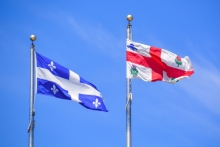September 6, 2022 | Professor Pearl Eliadis reflected on the Charter ahead of the Quebec elections and how the two pieces of legislation- and the CAQ's use of the notwithstanding clause to protect from their court challenges- show a "unilateral attempt by the CAQ to change our fundamental Charter and constitutional values," and a "pushing and pulling at the constitution."

August 6, 2022 | Recently, in Saguenay, Que., a pharmacist rejected a woman's request to purchase emergency oral contraception, claiming that then morning-after pill did not "align with his values." Human rights lawyer and Max Bell School professor Pearl Eliadis weighs in.

Abortion was already illegal in multiple US states in late June, with bans introduced within hours of Roe v Wade being overturned, as cities erupted in protest at the landmark ruling. It came after the US supreme court abolished the constitutional right to abortion, more than 50 years after it was established, leaving individual states to decide. It is ultimately expected to lead to abortion bans in about half of the states. (The Guardian)

With the last pre-election sessional period of Quebec's National Assembly drawing to a close last week, Max Bell School professor Pearl Eliadis joined CTV News Montreal to discuss the key legislative news of the past several months.

June 3, 2022 | After Bill 96 passed in the Quebec legislature, the government of Quebec published a full-page advertisement in both French and English newspapers to "correct falsehoods" circulating about the law. However, several legal experts - such as Max Bell's Pearl Eliadis - fact-checked the claims made in the ad in this article for CBC News.

May 19, 2022 | This City News article delves into the various reasons Quebec's Bill 96 is stirring controversy. Max Bell School professor Pearl Eliadis provides prospective on how the proposed law would affect access to justice.

There is a glaring gap in Quebec's healthcare system: Women whose immigration status is precarious are systematically denied access to critical reproductive and sexual health services. This, says Max Bell School professor Pearl Eliadis, must change.

April 28, 2022 | Numerous English-language advocacy groups have raised concerns about potential constitutionality issues with Quebec's recently tabled Bill 96, which was introduced as a means to safeguard the status of the French language. In this interview on CBC Radio, Max Bell School professor and humans rights lawyer Pearl Eliadis weighs in.

May 2022 | Writing for the Literary Review of Canada, Max Bell School professor Pearl Eliadis reflects on her three UN missions to Rwanda in the aftermath of the 1994 genocide and provides perspective on the trajectory of the country in the ensuing years.

As a member of the pro bono legal team supporting Médecins du Monde (Doctors of the World) Canada, Max Bell School professor Pearl Eliadis is pushing the Quebec government to extend public health care to women in Quebec whose immigration status is precarious and who need reproductive and sexual health services. Recently, Eliadis contributed to a brief which was submitted to the Government of Quebec.

February 15, 2022 | On Radio Noon Quebec with Shawn Apel, and on Quebec AM, professor Pearl Eliadis discusses the criteria for Prime Minister Justin Trudeau invoking the Emergencies Act in response to the ongoing convoy protests across Canada.

February 9, 2022 | McGill Alumni hosted a Made by McGill webcast featuring professors Pearl Eliadis and Nicholas King entitled "Defining freedom in the time of COVID."

January 12, 2022 | Joining the CBC's Radio Noon Quebec with Shawn Apel, Professor Pearl Eliadis cautions that it's premature to discuss the legality of the "no-vax tax" or health contribution the Quebec government is proposing on unvaccinated Quebecers, as the legislation has not been made publicly available yet.
"We don't know enough yet to know if it's legal, but I do think it's bad public policy," she comments.

January 12, 2022 | After the Quebec government announced unvaccinated Quebecers would have to pay a "health contribution," Professor Pearl Eliadis weighs in on the legality and enforcement of such a proposition.
“Are we really going to go and find 800,000 people, (some of whom) are low-income earners or have disabilities?” she asked. “What are we going to do, seize their couch (if they can’t afford to pay)?”

January 5, 2022 | Professor Pearl Eliadis was interviewed for this public health article about COVID-19 pandemic restrictions for Prince Edward Island and their impact on businesses and tourism.
Professor Eliadis said something the pandemic has shown is that public health and economic interests aren't in competition – they are one and the same.
"Countries overall that have emphasized suppressing disease over supporting or taking measures to allow economic activity have actually done better on both fronts," she said.

